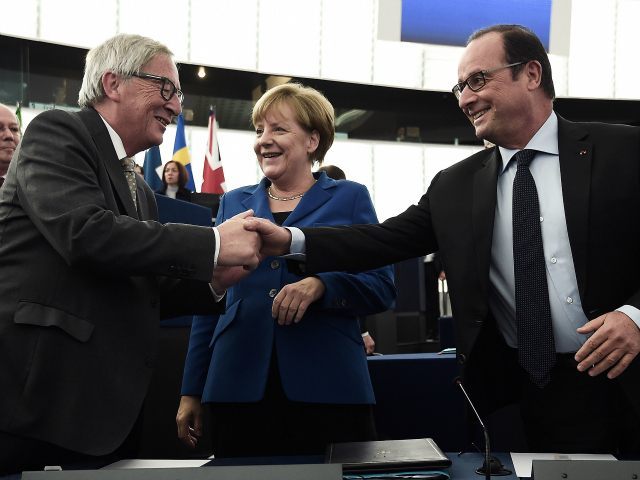For the first time in 25 years, the French President and German Chancellor, now Hollande and Merkel, came to address the European Parliament in Strasbourg.
The feeling was very different to those days when Kohl and Mitterand, monsters that they were, drove the European Union (EU) on towards its single currency and all the problems that manifest themselves today.
President Hollande called Mitterand a great European in his speech. Well, he was awarded an honour by the Vichy government and was friendly with those who allowed the deportation of Jews to the camps in Poland. Not my kind of hero.
The odd thing about the visit was that there was no huge sense of occasion. No feeling that anything radical, fresh or new was to be added. Indeed their message was simple: things have gone wrong so we need more Europe. Hollande called for a beefed-up EU. Merkel for more economic co-ordination. Their initial speeches were heavily scripted, dull and not very inspiring.
At no point did either leader mention the British referendum. They were too busy worrying about forthcoming national elections, the Euro crisis and the self-inflicted migrant fiasco.
Both speeches were applauded by the Parliament but there was no euphoria in evidence. When it came to the rounds of group speakers, I noticed how many of them now speak German. Which fitted in with my line, that when Kohl and Mitterand came, it was a partnership of equals but that now, France was little more than a pipsqueak. That the project which had originally been designed to contain Germany had instead led to a totally German-dominated project.
Angela Merkel did not look as though she was enjoying her afternoon very much, mind you she rarely does. I pointed out that her call for all to come to Europe had been a catastrophic policy failure that had led to a Europe that is now even more divided over the migrant crisis than it is on the Euro.
Since that time, the Slovakian Prime Minister Robert Fico has made it clear that he would rather leave the EU than accept Brussels-imposed quotas.
I was the first speaker to even mention the British referendum and express my hope that an amicable divorce for the United Kingdom would mark the beginning of the end of this unloved project.
In response, Mrs. Merkel had very little to say. Though she did claim that the EU was enjoying some successes, citing the upcoming Paris climate conference. Yes that’s right. The German Chancellor thinks that even more restrictions and uncompetitive taxes on the EU’s manufacturing sector is a success. She sat down and looked for all the world like a person that did not want to be there.
But Monsieur Hollande surprised everyone. Speaking off the cuff, he made a strong and passionate plea for a full European foreign policy and expressed the importance of developing a European army. He finished by saying: “I heard what Mr. Farage said but the only road for those who are not convinced of Europe is to leave Europe.” He later said this would be a “logical path”.
Strangely, the British media including the BBC have expressed little or no interest in the clearest indication yet that there is no British “renegotiation”, that nothing is going on, and indeed that nothing will be given. I was surprised. I thought that alone should have made headlines.
ANOTHER LEAVE CAMPAIGN
I am pleased that Business for Britain, the Westminster-based Conservative-leaning group have finally, albeit reluctantly, come off the fence.
They have the support of some well-known businessmen and quite a few Members of Parliament.
The more people from across society who speak in favour of Britain taking back control of its own affairs the better. Indeed they are already making the case that British business suffers from too much EU red tape. They are also making the case that we absolutely must be free to make our own trade agreements. After decades of lies that without EU membership we can’t buy or sell widgets from each other, this argument is clearly important.
However, to win this referendum we don’t just need to convince business. We have to reach out way beyond Westminster and in particular reach people who generally do not vote at all. For them, the arguments that most are likely to convince are about pride in our country and the total necessity to control our borders.
I don’t see these two campaigns as contradictory. They are potentially complimentary. But what Leave.EU is achieving is a groundswell of genuine public support. With 200,000 people now signed up as official supporters, things are going well.
At some point the Leave campaign will need both Mr. Banks’s massive outreach campaign alongside the arguments of Westminster MPs and big businessmen.

COMMENTS
Please let us know if you're having issues with commenting.